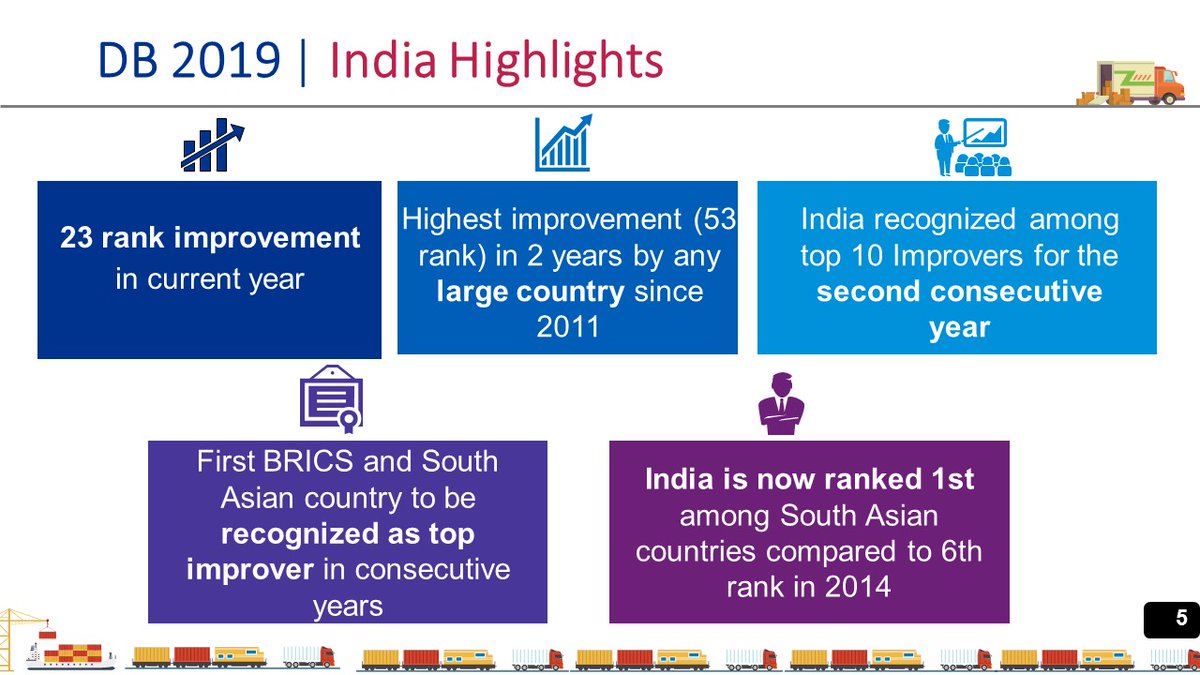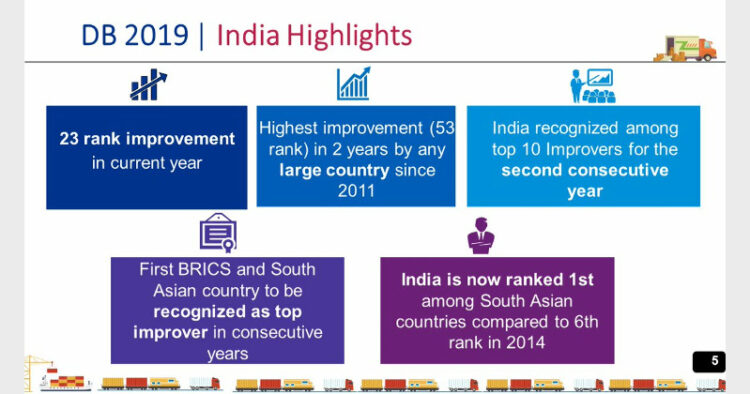
New Delhi: The rank in Trading Across Borders has taken a quantum leap from 146 to 80 in the Doing Business report released by World Bank today. Among the 11 parameters based on which the rankings are determined and which include indices like Starting a Business, Getting Electricity and Resolving Insolvency, the improvement in India’s overall ranking this year can be mainly attributed to an exceptional performance in Trading across Borders where India’s rank improved from 146 to 80 since last year. This positive jump is due to a series of reforms undertaken by Customs in conjunction with Ministry of Shipping and all stakeholders such as importers, exporters, Customs Brokers, CFS operators, Shipping lines and Terminal Operators.
Trading Across Borders constitutes one of three most important components of the ten parameters which the World Bank measures. This parameter assesses the efficiency of time taken in clearing the imported and export goods and the cost involved in these processes. The rankings are a solid testimony of our commitment to improving the business environment in the country. Improvement in ranking is a clear endorsement and recognition of reforms carried out by Customs in last years.
Customs has undertaken several initiatives which included enhanced coordination with other ministries and stakeholders, extensive use of digitization and new technologies and business process re-engineering to facilitate trade. Customs has come out with a National Trade Facilitation Action Plan which provides a road map for fulfilment of India’s commitments under the Trade Facilitation Agreement. These initiatives by the government have also earned praise by the World Customs Organization (WCO). By introducing SWIFT, a Customs Single Window, Customs has unified the entire clearance process on a single digital platform. It has given a fillip to trusted trader program by completely revamping AEO (Authorised Economic Operator) scheme. For trusted traders, facility of deferred payment of duty has been made available. Risk rules for interdicting consignments have been fine-tuned, which enabled higher facilitation levels. With the roll or of flagship reform eSANCHIT, Customs de-materialised the clearance ecosystem by dispensing with submission of hard copy of the documents thereby making the entire process of consignment clearance faceless and paperless. Customs also introduced game changer initiative Direct Port Delivery (DPD). Almost 47% of the containers at India’s biggest port Nhava Sheva can be cleared directly from the port to the importers premises within 60 hours. Containers now move seamlessly from port to importers warehouse without having to be parked in CFSs thereby cutting dwell time and cost. Self-sealing using RFID e-seals had been introduced on the export side. Now exporters can plan the movement of containers as per their scheduling without having to wait for departmental officers to seal the containers. A major push was given to allow more and more containers under direct port entry scheme so that routing through intermediary CFSs could be avoided.
Customs has done a major software and hardware upgradation of ICEGATE. Time release studies (TRS) have been carried out at Nhava Sheva which clearly reflected the actual time of clearance in case of import as well as export was much lesser than the reflected in previous years ratings. Even the results of TRS have been vindicated in the DMICDC supervised Logistics Databank project which records the actual timestamps of export and import containers plying on the western sector. Ministry of Shipping has also ensured upgradation of infrastructure in the ports and introduced strict monitoring of time taken in port operations. The measures like Advance filing by Importers, Self-sealing using RFID seals by Exporters, supporting paperless clearance by Customs Brokers, issue of e-delivery orders by Shipping lines, supporting DPD and DPE initiatives by CFS operators and faster evacuation time by Terminal operators have directly contributed to time and cost savings.
Customs department acknowledges the invaluable role by field officers and remarkable cooperation by all coordinating Ministries, especially Shipping, Commerce, DIPP, etc and all other stakeholders in achieving the improved rank. This improvement is the fruit of team effort. While substantive improvement in ranking has been achieved in Trading Across Borders, there is still room for further reforms which would be continued by CBIC in future.














Comments